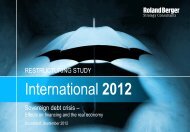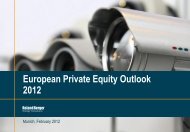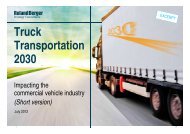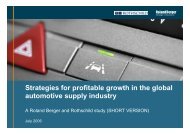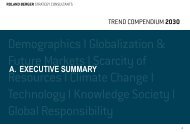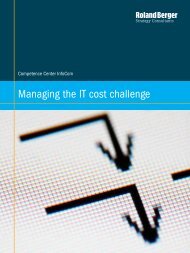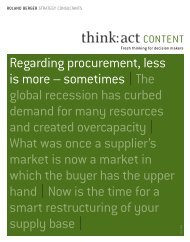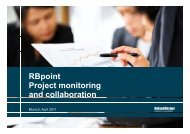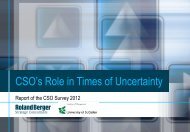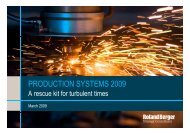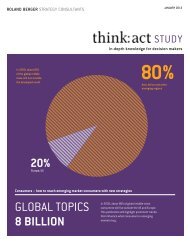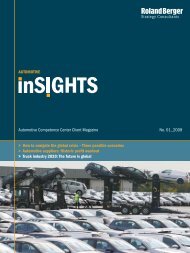issue 1 - Roland Berger
issue 1 - Roland Berger
issue 1 - Roland Berger
You also want an ePaper? Increase the reach of your titles
YUMPU automatically turns print PDFs into web optimized ePapers that Google loves.
DOSSIER #01 The formula for growth<br />
nSYMANTEC<br />
The US manufacturer of security software<br />
is the global market leader and manages<br />
its sales via excellent relations with over<br />
600 international corporate groups.<br />
32.5%<br />
Symantec increased<br />
its profit margin from<br />
20.3 to 32.5 percent.<br />
SOURCE: SPEAR SECURITY INDUSTRY ANALYST NEWS<br />
»We intend to achieve<br />
massive growth by<br />
visibly outperforming<br />
the market.«<br />
JOHN W. THOMPSON,<br />
CEO, SYMANTEC<br />
OPERATING PROFITS (in $ million)<br />
136<br />
32<br />
CAGR: 58 %<br />
357<br />
532<br />
2000 2001 2002 2003<br />
Symantec handled the 2001 slump<br />
well. Despite the setback of 2000 to<br />
2003, its midyear operating (CAGR)<br />
results increased by 58 percent. The<br />
reason: continuous acquisitions and a<br />
consistent brand-name strategy.<br />
be noted, however, that five years of intensive research<br />
went into the designer food. It is therefore not surprising<br />
that Nestlé is looking for strong joint-venture partners<br />
to help shoulder the load. Jointly with the French<br />
cosmetics group L’Oréal, in which Nestlé holds a 26.4<br />
percent stake, it is developing beauty tablets that slow<br />
down the visible effect of aging on skin, hair and nails.<br />
The financing for such research projects comes from<br />
the “Life Ventures” risk capital fund.<br />
IN ADDITION, Brabeck-Letmathe is counting on<br />
specific purchases to reap increasing economies of<br />
scale and scope in the core businesses. In June 2003<br />
Nestlé acquired Dreyer’s, the second largest US ice<br />
cream producer, for $2.8 billion. Just a short time earlier,<br />
Nestlé had purchased the German company Schöller<br />
Group and the Swiss ice cream brand Mövenpick. For<br />
Brabeck-Letmathe, who very early in his career delivered<br />
ice cream by truck, expansion is by no means an<br />
end in itself. “We’re not looking to be the largest company,<br />
rather the most competitive one.” His personal<br />
motto expresses the desire both to grow and to improve<br />
margins. “The art of good management consists of<br />
achieving both simultaneously,” emphasizes the Nestlé<br />
CEO. Keeping these in balance sometimes also necessitates<br />
that Brabeck-Letmathe repeatedly divest parts of<br />
the company. Although 29 new plants were opened in<br />
2003 alone, 26 existing ones were also sold or closed,<br />
always with the overall objective of optimizing the<br />
group’s portfolio in a value-oriented manner.<br />
THE FACT THAT THE GROWTH curve looks different<br />
for various sectors also holds true for different regions,<br />
as exemplified by the electronics giant Siemens. While<br />
the figures for Germany’s domestic market in the<br />
slumping sectors of communications and transportation<br />
systems point to consolidation, Siemens is on an<br />
expansion course in the United States with its “Siemens<br />
One” program. The growth strategy was conceived by<br />
the designated chairman of the board, Klaus Kleinfeld,<br />
who headed the company’s US operations and will<br />
replace Heinrich v. Pierer as chairman in January 2005.<br />
Kleinfeld’s successor, George Nolen, now can reap the<br />
fruitful outcome of this endeavor. By 2006, he is<br />
expecting additional business of at least €2 billion<br />
from established accounts alone. His cross-selling<br />
strategy aims to provide large-scale customers such as<br />
hospitals, sports arenas and rail companies with complete,<br />
one-stop infrastructure solutions. Siemens just<br />
received a contract worth up to $1.37 billion to install<br />
high-tech explosives-detection systems at all commercial<br />
airports in the United States. “We won the bid<br />
because we have the necessary experience in airport<br />
logistics, building security, baggage handling and X-ray<br />
scanning,” emphasizes Nolen.<br />
THE COMPANY ALSO has an advantage in that<br />
Siemens is increasingly perceived as a domestic entity<br />
in the United States. After all, the company employs<br />
70,000 people there, almost all of them Americans.<br />
Siemens is pursuing its decentralization strategy also<br />
for another reason. In a monolithic organization, mental<br />
barriers and cultural differences can end up inhibiting<br />
growth. “In the past, we did not always understand the<br />
needs of our customers,” notes Nolen. In order to minimize<br />
such conflicts, Siemens depends almost exclusively<br />
on “locals” in all countries, who usually better<br />
understand the regional market and its particular customer<br />
requirements. For v. Pierer, Siemens is, as a<br />
result, “a German company in Germany, a US company<br />
in the US and a Chinese company in China.”<br />
THE SIGNIFICANCE OF “soft” growth factors, especially<br />
during periods of change situations, can hardly be<br />
overestimated. Subcultures often crop up, especially<br />
after mergers and larger-scale organizational change<br />
projects. These can influence employees more than the<br />
actual corporate culture, and can cause divisions to<br />
insulate themselves from one another or even prevent<br />
their integration after a merger. Open communications,<br />
a willingness to discuss matters and corporate management’s<br />
competence to make decisions with the<br />
employees’ backing prevent this type of drift. Successful<br />
growth companies find their identities less in their<br />
products, but in their group-wide set of values. Even if<br />
the wording is similar in many companies, the important<br />
thing is that values are openly agreed upon and<br />
actually put into practice on a daily level. Siemens CEO<br />
v. Pierer considers the integrity of both its business<br />
policies and its responsible employees the core value of<br />
the company. From this he derives principles such as<br />
decency, honesty, sincerity, openness and tolerance.<br />
26<br />
think: act



